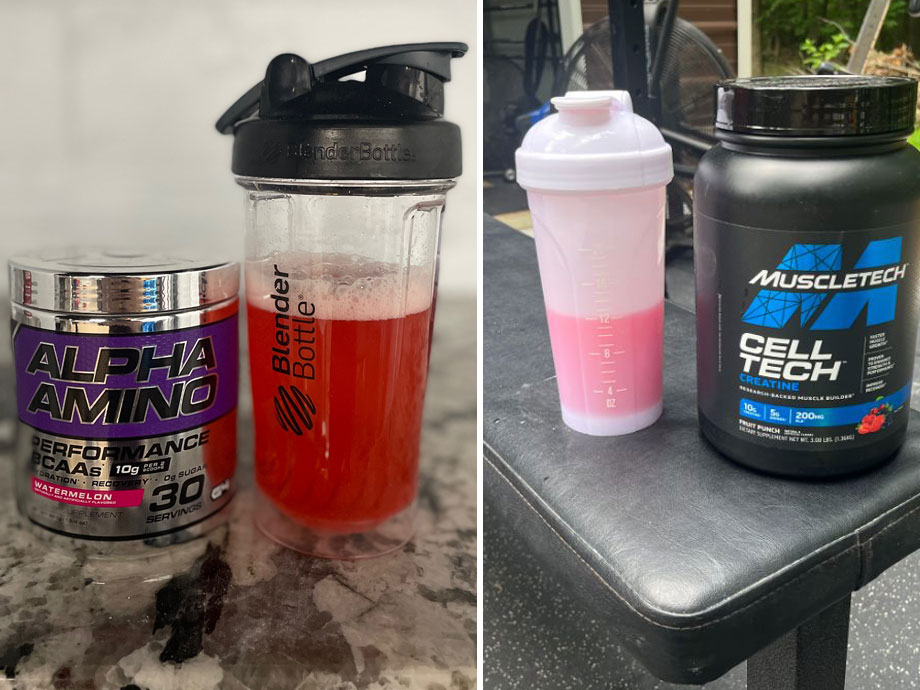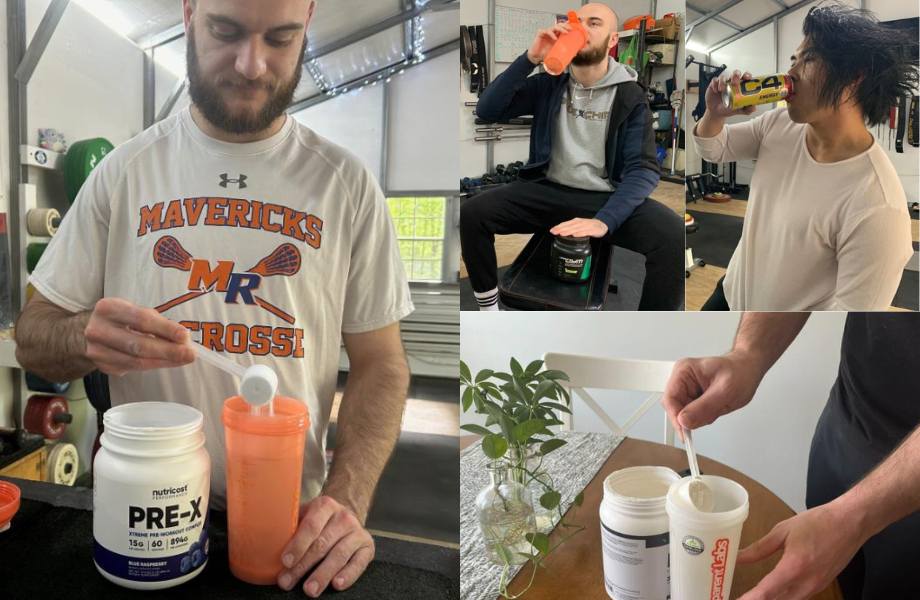Fit-minded folks are constantly navigating a sea of supplements, so I’m here to talk about two of the most well-known—branched-chain amino acids (BCAAs) and creatine—each a staple for many bodybuilders, CrossFitters, and even newcomers to the fitness world.
Things can get a bit complicated in terms of timing, dosage, and effectiveness when taking multiple supplements at a time, and you probably want to know the best time to take creatine and BCAAs for the optimal results. The thing is, when it comes to these two popular supplements, there may not really be such a thing as perfect timing.
As a registered dietitian and certified personal trainer, I’ll discuss evidence-based considerations for when to take BCAA and creatine so you can make the most informed decision about your nutrient timing!
RELATED: Best Creatine
Medical disclaimer: This article is intended for educational and informational purposes only. It is not intended as a substitute for medical advice. For health advice, contact a licensed healthcare provider.
Is It OK to Take Creatine and BCAAs at the Same Time?
I’m willing to bet this question has crossed your mind. The answer is yes: taking creatine and BCAAs at the same time is perfectly safe, so feel free to do so. Neither supplement interferes with the effects of the other. Also, creatine and BCAAs are often conveniently included together in pre-workout supplements to provide a variety of benefits from multiple exercise-boosting ingredients.
RELATED: BCAA vs Creatine: An RD Weighs In
When Should I Take Creatine and BCAAs?
There’s no specific time of day when taking creatine and BCAAs together will be significantly more effective for most people.
Overall, creatine can be taken any time of day1 and should provide the same benefits for building muscle and strength over time. There aren’t any significant differences when taking it in the morning versus the evening, with a meal versus on an empty stomach, or taking it before or after a workout. This is because creatine supplementation works by raising your muscle creatine stores, which happens no matter what time of day you take it. Just make sure to take it consistently so your muscle creatine stores remain elevated over time.
Similarly, there isn’t an optimal time of day when you should take BCAAs. There could be some slight advantages when taking them in specific situations, such as helping to reduce fatigue2 when taken during a workout, but we need additional research to confirm these preliminary findings.
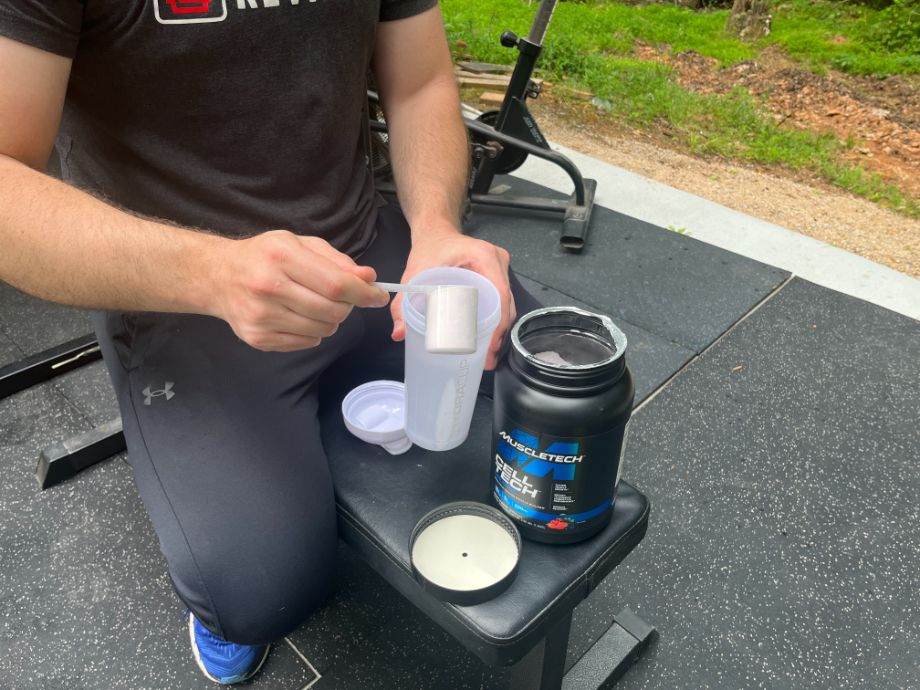
As it stands, the majority of research on BCAAs hasn’t shown any clear improvements in exercise performance when taking them before, during, or after a workout.
Feel free to incorporate BCAAs and creatine into your routine at any time that suits you best since their effectiveness isn’t dependent on a specific time of day. I’d advise against having them too close to a protein-rich meal, however, since the body uses amino acids most efficiently when spread evenly throughout the day.
There’s also no need to rush to take them within 30 minutes after working out. It used to be thought that amino acids are optimally absorbed and utilized for building muscle within a short post-workout period known as the “anabolic window,” but we now have recent evidence3 suggesting this window probably lasts for at least a few hours.
One caveat—if you like to exercise in a fasted state, it’s best to refuel quickly after a workout to minimize muscle tissue breakdown.
RELATED: When Is The Best Time to Take Creatine?
What Are BCAAs?
Branched-chain amino acids (BCAAs) refer to three specific amino acids: leucine, isoleucine, and valine. They get their name from the characteristic branching of their chemical structures, similar to a small tree branch “branching” off from a larger one. Other essential amino acids don’t have this branched structure.
RELATED: Best BCAA

These amino acids are essential, meaning we must get them from food since the body can’t produce them itself. Other non-branched essential amino acids exist as well.
BCAAs are known to stimulate muscle protein synthesis. Said another way, they act as a kind of trigger for the body to start building muscle. Leucine plays a particularly key role in initiating the muscle-building process, which is one of the primary reasons that BCAA supplements have become so popular. Supplements often include a 2:1:1 ratio of leucine, isoleucine, and valine, respectively.
RELATED: Best Ratio for BCAAs
Benefits of BCAAs
There are so many claims about BCAAs and exercise that it can be hard to keep track, even for dietitians. Just a few benefits of BCAAs that you may read about on popular websites or hear about from fitness influencers include:
- Help build muscle
- Serve as intra-workout fuel for muscles
- Minimize muscle breakdown during weight loss
- Speed up muscle recovery
- Prevent fatigue
- Reduce soreness and muscle damage
Despite their popularity, most of these BCAA benefits are a bit overhyped. A big reason for this is that BCAAs are already present in protein-containing foods. This means that as long as you’re meeting your daily protein needs, you’re already getting enough BCAAs.
Research in the International Journal of Sport Nutrition and Exercise Metabolism4 indicates that for the majority of people, taking extra BCAAs when you’re already eating enough protein from food and whole protein supplements doesn’t help build additional muscle size or strength. Older adults may be an exception since they have higher leucine needs and often struggle with their protein intake, but research on this is still preliminary.
BCAAs can indeed be helpful if you aren’t eating enough protein, but in this situation, your focus should be on getting more intact proteins containing all the essential amino acids before adding a BCAA supplement.
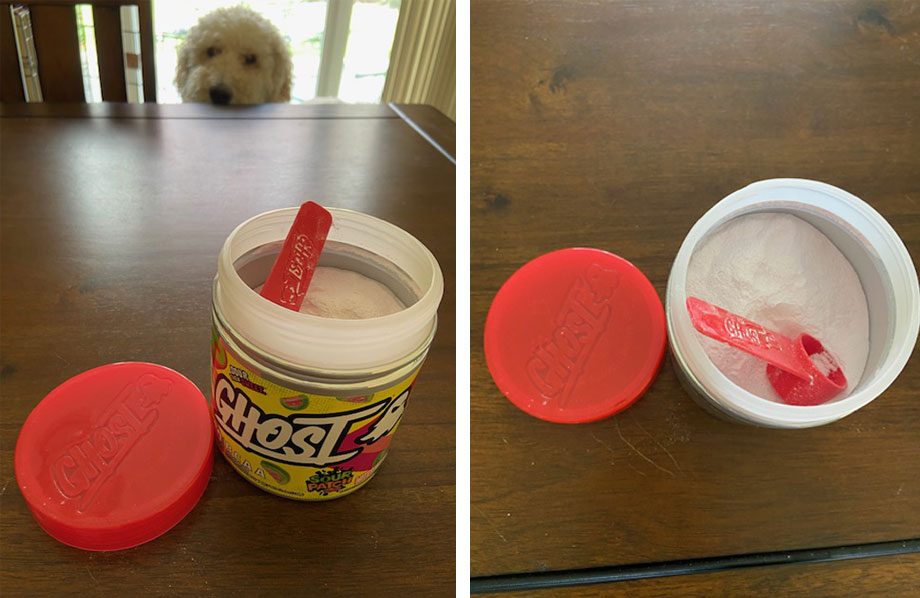
BCAAs are often taken before a workout as a source of fuel. Because BCAAs are oxidized in the muscles, they’re seen as a convenient source of energy. However, a 2022 systematic review5 analyzing BCAA use in athletes found that BCAAs have negligible effects on exercise performance and body composition.
RELATED: Do BCAAs Give You Energy?
Carbohydrates, on the other hand, are an absolutely essential source of energy for working muscles and will likely help you work out much more effectively when compared to BCAAs.
This systematic review did suggest, however, that BCAAs can help reduce delayed-onset muscle soreness known as DOMS. This may be because BCAAs are used by the body to produce glutamine, another amino acid known to reduce muscle soreness6 and fatigue7.
Studies didn’t keep good track of how much protein participants were consuming, however, so it isn’t super clear whether the reduction in muscle soreness was due directly to the BCAAs.
If true, BCAAs may make it easier to stick to your workout schedule. If you’ve ever had to skip a workout because you’re still too sore from the last one, you know how frustrating it can be. An important caveat, however, is that BCAAs seem to be more helpful in reducing soreness after resistance training compared to endurance exercise.
Muddying the waters even further, many studies use supplements with multiple ingredients. This makes it difficult to tell how much of the fatigue-reducing effects are due directly to BCAAs alone.
RELATED: Best Pre-Workout With BCAAs
What Is Creatine?
Creatine is an amino acid-like molecule produced naturally in the liver, kidneys, and pancreas from the amino acids methionine, arginine, and glycine. Its chemical makeup looks similar to that of an amino acid, but creatine isn’t considered an amino acid itself. Unlike true amino acids, creatine doesn’t provide calories and isn’t used to directly build muscle tissue, produce hormones and neurotransmitters, or create enzymes.
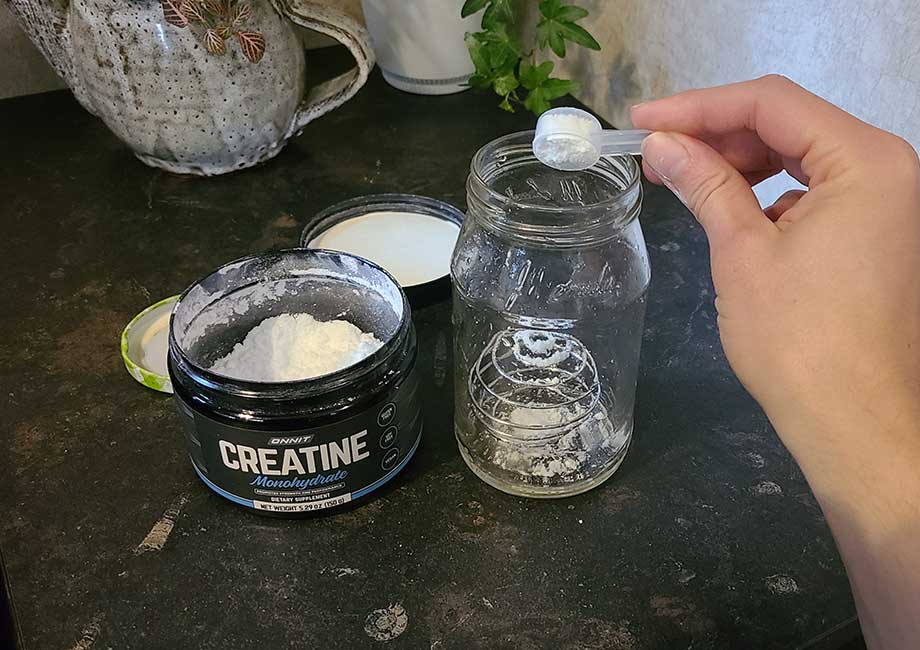
Most of the body’s creatine is stored as phosphocreatine (also known as creatine phosphate) in skeletal muscle tissue. Here, it helps with energy production during short-duration, high-intensity exercises like weight lifting and sprinting. Creatine does this by helping to regenerate adenosine triphosphate (ATP), a molecule that releases energy when broken down by the body during these types of exercises.
RELATED: What is Creatine?
Benefits of Creatine
Creatine monohydrate is one of the most effective sports nutrition supplements. There’s a plethora of research supporting creatine benefits, such as building lean muscle mass (also known as “hypertrophy”) and strength when taken consistently and paired with a resistance training regimen.
The goal of creatine supplementation is to completely saturate the muscles with creatine. You can also get creatine from foods like red meat, poultry, and eggs, but the muscles are only about 60 to 80% saturated even when consuming these foods.

Vegans and vegetarians have even lower muscle creatine stores, and creatine monohydrate supplementation is an effective way of loading the muscle with as much creatine as possible. This, in turn, increases the amount of energy available during anaerobic exercise.
So, what kind of results can you expect during a workout? Practically speaking, creatine can help you perform more reps when lifting weights or perform multiple sprints (see creatine and cardio) more efficiently. Over time, this can improve your muscle gain and strength to a higher degree than if you hadn’t taken creatine.
RELATED: How to Use Creatine
Benefits of Mixing BCAAs and Creatine
The biggest benefit of mixing BCAAs and creatine is simply the convenience. You’ll get the same results from creatine no matter what time of day you take it as long as you’re taking the correct amount, so you can easily take it whenever you prefer to take your BCAAs.
As mentioned earlier, BCAAs won’t make much of a difference if you’re already getting enough protein in your diet, which many people do when considering whole foods as well as protein shakes, bars, and other protein supplements. It’s important to remember that these foods already contain BCAAs.

If you aren’t getting enough protein, it’s better to focus first on getting 20 to 40 grams per meal before you worry about taking BCAAs. Other (non-branched) essential amino acids in protein foods are needed to sustain the muscle-building process4, which will be limited if you aren’t getting enough of them. Protein-rich foods also provide other valuable nutrients like iron and zinc, while plant-based proteins contain anti-inflammatory dietary fiber.
RELATED: High-Protein Foods
There aren’t many studies that have analyzed the benefits of combining only BCAAs and creatine, but we do have research on the effectiveness of multi-ingredient pre-workout supplements8 which often contain both ingredients in addition to others like caffeine, beta-alanine, and l-citrulline.
Pre-workouts with multiple ingredients have been shown to help with muscle growth, but creatine likely plays a much more important role than BCAAs based on what we know about these ingredients.
When to Take BCAA and Creatine: Final Thoughts
In conclusion, you can be flexible with the timing of your supplementation when taking BCAA and creatine together or separately. There doesn’t appear to be any significant difference in how effective they are based on the time of day, so feel free to take them pre- or post-workout.
That said, creatine is likely to be much more effective for building lean muscle and strength than BCAAs will since most people already get enough BCAAs from food and intact protein supplements. BCAAs may reduce muscle soreness but haven’t been shown to have much impact on actual exercise performance.
If you’re interested in combining different supplements, you might enjoy learning whether you can mix creatine with protein powder.
When to Take BCAA and Creatine: FAQs
Is it better to take creatine and BCAA before or after workout?
Taking creatine and BCAA before a workout is just as effective as taking them afterward, so feel free to use either timing strategy.
How often should I take BCAA and creatine?
Creatine should be taken every day to maintain high muscle creatine stores, even on rest days. For maintenance, 3 to 5 grams of creatine monohydrate per day should do. BCAAs can also be taken every day, although there isn’t enough research to say what the optimal dosing schedule is.
When should I take BCAA for best results?
Currently, there isn’t enough research on the optimal time to take BCAAs for improvements in athletic performance. If you recently had a meal, it might be helpful to wait a few hours before taking BCAAs to ensure your amino acid intake is spread more evenly throughout the day.
These statements have not been evaluated by the Food and Drug Administration. This product is not intended to diagnose, treat, cure, or prevent any diseases.
References
- Candow DG, Forbes SC, Roberts MD, et al. Creatine O’Clock: Does Timing of Ingestion Really Influence Muscle Mass and Performance?. Front Sports Act Living. 2022;4:893714. Published 2022 May 20. doi:10.3389/fspor.2022.893714
- Kim DH, Kim SH, Jeong WS, Lee HY. Effect of BCAA intake during endurance exercises on fatigue substances, muscle damage substances, and energy metabolism substances. J Exerc Nutrition Biochem. 2013;17(4):169-180. doi:10.5717/jenb.2013.17.4.169
- Arent SM, Cintineo HP, McFadden BA, Chandler AJ, Arent MA. Nutrient Timing: A Garage Door of Opportunity?. Nutrients. 2020;12(7):1948. Published 2020 Jun 30. doi:10.3390/nu12071948
- Plotkin DL, Delcastillo K, Van Every DW, Tipton KD, Aragon AA, Schoenfeld BJ. Isolated Leucine and Branched-Chain Amino Acid Supplementation for Enhancing Muscular Strength and Hypertrophy: A Narrative Review. Int J Sport Nutr Exerc Metab. 2021;31(3):292-301. doi:10.1123/ijsnem.2020-0356
- Martinho DV, Nobari H, Faria A, Field A, Duarte D, Sarmento H. Oral Branched-Chain Amino Acids Supplementation in Athletes: A Systematic Review. Nutrients. 2022;14(19):4002. Published 2022 Sep 27. doi:10.3390/nu14194002
- Córdova-Martínez A, Caballero-García A, Bello HJ, Pérez-Valdecantos D, Roche E. Effect of Glutamine Supplementation on Muscular Damage Biomarkers in Professional Basketball Players. Nutrients. 2021 Jun 17;13(6):2073. doi: 10.3390/nu13062073. PMID: 34204359; PMCID: PMC8234492.
- Coqueiro AY, Rogero MM, Tirapegui J. Glutamine as an Anti-Fatigue Amino Acid in Sports Nutrition. Nutrients. 2019;11(4):863. Published 2019 Apr 17. doi:10.3390/nu11040863
- Harty PS, Zabriskie HA, Erickson JL, Molling PE, Kerksick CM, Jagim AR. Multi-ingredient pre-workout supplements, safety implications, and performance outcomes: a brief review. J Int Soc Sports Nutr. 2018;15(1):41. Published 2018 Aug 8. doi:10.1186/s12970-018-0247-6


